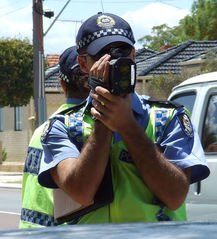 I frequently receive phone calls from clients who have received a speeding ticket for driving at a high rate of speed. While speaking with these clients, it is not uncommon for me to find out that they were driving at such a high rate of speed that I need to explain to them that what they are charged with is not your typical, run-of-the-mill, speeding ticket. I end up having to explain to them that what they are facing is a criminal charge known as Aggravated or Excessive Speeding that carries a possible jail sentence in County Jail. Let me explain how an Aggravated or Excessive Speeding ticket in Illinois can land you in jail and lead to a criminal conviction that will appear on your record in a routine background search.
I frequently receive phone calls from clients who have received a speeding ticket for driving at a high rate of speed. While speaking with these clients, it is not uncommon for me to find out that they were driving at such a high rate of speed that I need to explain to them that what they are charged with is not your typical, run-of-the-mill, speeding ticket. I end up having to explain to them that what they are facing is a criminal charge known as Aggravated or Excessive Speeding that carries a possible jail sentence in County Jail. Let me explain how an Aggravated or Excessive Speeding ticket in Illinois can land you in jail and lead to a criminal conviction that will appear on your record in a routine background search.
Most speeding tickets are considered a petty offense. The typical speeding ticket carries a fine only. This means that you cannot go to jail for your typical speeding ticket. Basically, Illinois Law provides that you cannot drive at a speed that is “greater than is reasonable and proper with regards to traffic conditions and the use of the highway, or endangers the safety of any person or property.” This basically means that you must drive at a safe speed. What is considered a safe speed depends on the conditions at the time. In other words, what is considered a safe speed may vary depending on the time of day and the weather conditions. However, if you are caught driving above the absolute speed limit, you may receive a ticket for speeding regardless of the time of day and conditions. If the speed limit is 55 and you are driving faster than the speed limit, you may receive a ticket regardless of the weather conditions or the time of day. The defense that you were driving with “the flow of traffic” will not work in Court. If the speed limit is 55 and you are driving 55 miles an hour in a blizzard while all the other cars on the roadway are driving at 30 miles an hour, you may receive a ticket for speeding even though you did not exceed the posted speed limit. As you can tell, being found guilty of speeding above the posted speed limit is much easier for the prosecutor to prove in court than it is for them to prove that you were driving greater than what was reasonable and proper with regard to traffic conditions and the use of the highway.
The absolute speed limit is posted on signs. In general, the absolute speed limits on Illinois roads are as follows, unless posted otherwise:
 If you are charged with a Misdemeanor crime in Illinois, you need to understand what a Misdemeanor is and what the implications could be for your future. A Felony criminal charge is much more severe than a Misdemeanor criminal charge. But that doesn’t mean that a Misdemeanor is not a big deal. While whether you are charged with a Misdemeanor or a Felony may make all the difference in the world you need to understand what a Misdemeanor is and what you are looking at when you go to Court.
If you are charged with a Misdemeanor crime in Illinois, you need to understand what a Misdemeanor is and what the implications could be for your future. A Felony criminal charge is much more severe than a Misdemeanor criminal charge. But that doesn’t mean that a Misdemeanor is not a big deal. While whether you are charged with a Misdemeanor or a Felony may make all the difference in the world you need to understand what a Misdemeanor is and what you are looking at when you go to Court. Chicago Criminal Lawyer Blog
Chicago Criminal Lawyer Blog


 I frequently receive phone calls from clients who have received a speeding ticket for driving at a high rate of speed. While speaking with these clients, it is not uncommon for me to find out that they were driving at such a high rate of speed that I need to explain to them that what they are charged with is not your typical, run-of-the-mill, speeding ticket. I end up having to explain to them that what they are facing is a criminal charge known as Aggravated or Excessive Speeding that carries a possible jail sentence in County Jail. Let me explain how an Aggravated or Excessive Speeding ticket in Illinois can land you in jail and lead to a criminal conviction that will appear on your record in a routine background search.
I frequently receive phone calls from clients who have received a speeding ticket for driving at a high rate of speed. While speaking with these clients, it is not uncommon for me to find out that they were driving at such a high rate of speed that I need to explain to them that what they are charged with is not your typical, run-of-the-mill, speeding ticket. I end up having to explain to them that what they are facing is a criminal charge known as Aggravated or Excessive Speeding that carries a possible jail sentence in County Jail. Let me explain how an Aggravated or Excessive Speeding ticket in Illinois can land you in jail and lead to a criminal conviction that will appear on your record in a routine background search. In a closely-watched decision regarding the privacy rights of cell phone users and the power of the police to obtain cell phone tracking information, the United States Supreme Court ruled that the police must obtain a warrant before obtaining the tracking information for the cell phones for most cellphone users.
In a closely-watched decision regarding the privacy rights of cell phone users and the power of the police to obtain cell phone tracking information, the United States Supreme Court ruled that the police must obtain a warrant before obtaining the tracking information for the cell phones for most cellphone users. I recently met with a client who had a jury trial for a Domestic Battery charge. After several days of a trial and deliberations, the jury could not agree on a verdict and the judge declared a mistrial. Shortly after the mistrial was declared, the prosecution decided that they would retry the client and he came to my office looking to hire me for the second trial. The client had several questions about what happens at a re-trial and whether Double Jeopardy applied to his case. I answered his questions and realized that people misunderstand what Double Jeopardy means.
I recently met with a client who had a jury trial for a Domestic Battery charge. After several days of a trial and deliberations, the jury could not agree on a verdict and the judge declared a mistrial. Shortly after the mistrial was declared, the prosecution decided that they would retry the client and he came to my office looking to hire me for the second trial. The client had several questions about what happens at a re-trial and whether Double Jeopardy applied to his case. I answered his questions and realized that people misunderstand what Double Jeopardy means. Yesterday, the United States Supreme Court issued several opinions on cases that had been closely watched by observers. The case that has received most of the public attention involves legalized sports betting. But lost in the coverage was the release of two opinions involving the 4th and 5th Amendment rights of criminal defendants. These opinions expand the rights of motorists in their vehicles and the rights of criminal defendants facing prosecution in Criminal Courts. I want to take this opportunity to discuss these two cases and how they will impact the criminal law.
Yesterday, the United States Supreme Court issued several opinions on cases that had been closely watched by observers. The case that has received most of the public attention involves legalized sports betting. But lost in the coverage was the release of two opinions involving the 4th and 5th Amendment rights of criminal defendants. These opinions expand the rights of motorists in their vehicles and the rights of criminal defendants facing prosecution in Criminal Courts. I want to take this opportunity to discuss these two cases and how they will impact the criminal law. Last week I had a meeting with a client in my office in Schaumburg who was being charged with a felony in Rolling Meadows. The client has a lawyer who was representing him for the case. The client came in for a consultation because he was not happy with the services that his current lawyer was providing and was considering hiring me to represent him in the case. The client told me that he had spoken to his lawyer and requested copies of the police reports. His lawyer refused to provide copies of the police report and the client was very upset with that decision.
Last week I had a meeting with a client in my office in Schaumburg who was being charged with a felony in Rolling Meadows. The client has a lawyer who was representing him for the case. The client came in for a consultation because he was not happy with the services that his current lawyer was providing and was considering hiring me to represent him in the case. The client told me that he had spoken to his lawyer and requested copies of the police reports. His lawyer refused to provide copies of the police report and the client was very upset with that decision. In the past several weeks, I have spoken to several clients who were arrested for Aggravated or Excessive Speeding and were charged with a crime. Most of the people I spoke to did not realize that they could be arrested for speeding. Many people do not understand the Illinois speeding laws and how a simple speeding ticket can lead to you being arrested and facing the real possibility of having a criminal conviction appear on your record and a possible jail sentence in your future. I want to take this opportunity to try to help people understand just how drastic the consequences of a speeding ticket in Illinois can be.
In the past several weeks, I have spoken to several clients who were arrested for Aggravated or Excessive Speeding and were charged with a crime. Most of the people I spoke to did not realize that they could be arrested for speeding. Many people do not understand the Illinois speeding laws and how a simple speeding ticket can lead to you being arrested and facing the real possibility of having a criminal conviction appear on your record and a possible jail sentence in your future. I want to take this opportunity to try to help people understand just how drastic the consequences of a speeding ticket in Illinois can be. It is common to have a client come into my office who is facing criminal charges resulting from a search of their vehicle by a police officer. Many of those clients want to know whether the police had the right to search their vehicle and whether I can have the evidence that was recovered thrown out of Court. There’s no simple answer to this question. Whether the police had the right to search the vehicle and whether I can convince the Court to throw out the evidence depends on the facts of each individual case. I want to talk a little bit about the general rules and what the constitutional limits are when it comes to the police searching a motor vehicle.
It is common to have a client come into my office who is facing criminal charges resulting from a search of their vehicle by a police officer. Many of those clients want to know whether the police had the right to search their vehicle and whether I can have the evidence that was recovered thrown out of Court. There’s no simple answer to this question. Whether the police had the right to search the vehicle and whether I can convince the Court to throw out the evidence depends on the facts of each individual case. I want to talk a little bit about the general rules and what the constitutional limits are when it comes to the police searching a motor vehicle. There was a time when eyewitness testimony was considered the best evidence in a criminal case. But recent scientific developments have cast doubt on the reliability of eyewitness testimony. Surveys of jurors in criminal cases show that jurors place great weight on the testimony of eyewitnesses. This can be dangerous because jurors will put greater weight on the testimony of an eyewitness and disregard other powerful and compelling evidence of innocence. Several high-profile cases in which defendants were convicted based on eyewitness testimony were later overturned after it was proven that the defendants were not guilty. Kyle Bloodsworth was convicted of the rape and murder of a nine-year-old girl based on the testimony of five eyewitness. He was later cleared of the rape and murder after DNA testing proved that he was innocent.
There was a time when eyewitness testimony was considered the best evidence in a criminal case. But recent scientific developments have cast doubt on the reliability of eyewitness testimony. Surveys of jurors in criminal cases show that jurors place great weight on the testimony of eyewitnesses. This can be dangerous because jurors will put greater weight on the testimony of an eyewitness and disregard other powerful and compelling evidence of innocence. Several high-profile cases in which defendants were convicted based on eyewitness testimony were later overturned after it was proven that the defendants were not guilty. Kyle Bloodsworth was convicted of the rape and murder of a nine-year-old girl based on the testimony of five eyewitness. He was later cleared of the rape and murder after DNA testing proved that he was innocent. Recently, I have represented clients who received speeding tickets. In the course of representing these clients, I have come to realize that people do not really understand the Illinois Speeding Laws. In the last few years, the Illinois speeding laws have been changed. The changes have drastically increased the penalties for excessive speeding on Illinois roadways. Drivers are not adequately informed of what the potential consequences can be for a speeding ticket.
Recently, I have represented clients who received speeding tickets. In the course of representing these clients, I have come to realize that people do not really understand the Illinois Speeding Laws. In the last few years, the Illinois speeding laws have been changed. The changes have drastically increased the penalties for excessive speeding on Illinois roadways. Drivers are not adequately informed of what the potential consequences can be for a speeding ticket.